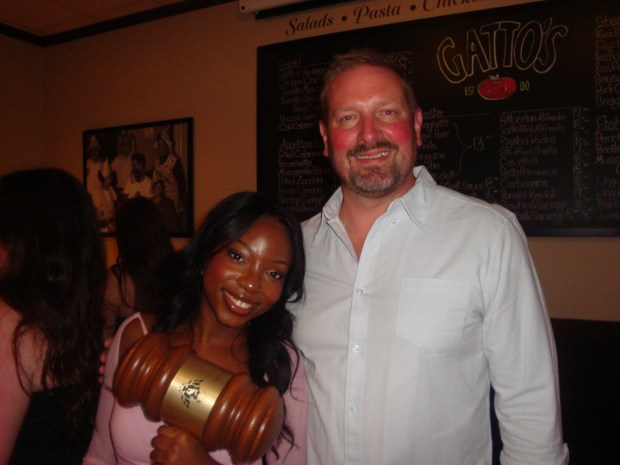Carl Sandburg High School senior Adunolaoluwa Ogedengbe is known for commanding the room at Model United Nations competitions with her signature opening line: “Delegates, we have blood on our hands.”
To drive her point home, Ogedengbe brings red paint to every conference. She begins her first speech with her left hand raised, covered in paint, as she delivers a powerful string of statistics meant to confront delegates with the urgency and gravity of the issue at hand.
For her, representing a country at Model UN isn’t just an academic exercise, it’s a chance to engage with real-world issues that affect millions of lives. Before each conference, she dives into research on her country’s position, preparing to deliver informed, realistic and impactful solutions.
“I’m someone who is really interested in humanitarian issues and the intersection between humanitarian crises and policy making,” she said. “I don’t just view it as I’m competing in MUN. I view it as I’m representing these people. I’m researching these people, and I want to do it to the best of my ability.”
Before graduating from Carl Sandburg, Ogedengbe was recognized by High School District 230 for her achievements in the club. She holds more top honors, including gavels awarded in place of medals for Model UN, than anyone in the school’s history, the district said in a news release.
The previous record was set in 2020 with 14 gavels, and she broke that record in November and finished the season with 22 gavels, the school district wrote. Ogedengbe is the only Carl Sandburg delegate to have never lost a Model UN competition, the district wrote.
She also set the record for the most points ever earned in Sandburg’s Model UN history, earning a spot in the club’s hall of fame, the school district wrote. Out of more than 2,000 students in the hall of fame, Ogedengbe has the highest point total with 210 and has earned 30 awards including 22 first-place gavels, four second-place outstandings, one third-place honorable mention and three commendable distinctions, they wrote.
“We are incredibly proud of Adunola and all that she has accomplished,” Anita Huffman, assistant superintendent of instructional services, wrote in a statement. “Her success reflects the dedication, discipline and passion she brings to every endeavor, both in and out of the classroom.”
Ogedengbe recalls a conference her freshman year at the University of California, Berkeley. Typically reserved for seniors and a few juniors, the overnight conference wasn’t one she was scheduled to attend until a last-minute dropout opened a spot.
“I was super panicked and freaked out, honestly, because I was only put in three days before, while people had been prepping for three months,” Ogedengbe said. “So I’m in a committee against, obviously, upperclassmen, people who are at their last conference, their last hurrah. And I’m just this tiny freshman who just got put in three days before.”
When she won a gavel, Ogedengbe said she was in disbelief.
But the win reassured her that she belonged and knew what she was doing. It was also the first conference where she spoke without notes, which is a challenge even for experienced public speakers, she said.
“That’s where I feel like I really honed my ability to think creatively on the spot,” she said. “I’m someone who is very elaborate in my speeches. I’m very dramatic, and when I talk, I’m very expressive. I use my hands a lot. My voice fluctuates a lot. I think that really captivated people’s attention. And I think that’s something that distinctly set not only my school part, but also myself.”
Model UN members spend hours getting ready for a competition, the school district wrote. At weekend overnight events, they debate for 12 to 20 hours, and at local single-day events, they debate for about four to seven hours. Judges provide general information about the topic and members write a position paper, or one-page summary of a country’s past, present and future actions.
Then delegates spend time gathering extra research, including statistics, ideas for solutions and other useful information, all organized into a “lifeline” to help debate the stance, the district wrote.
Although Ogedengbe found success early in her high school Model UN career, she said it wasn’t until her junior year that she truly began to let go of the pressure. Learning to relax and enjoy the experience, she said, allowed her personality to shine.
At Carl Sandburg, personality was highly valued both in the club and at competitions, and it helped Ogedengbe stand out, she said. More importantly, it allowed her to bring a human element to the issues being debated, and rather than simply rattling off statistics, she aimed to tell the stories behind them and give the topics the depth and empathy she felt they deserved.
“That’s something we do very well at our school — through our hopes, through our creativity, in our speeches, in the way we get our quotes across — we use our personality in that. We speak with personality,” she said.
Ogedengbe was accepted into Brown University’s program in liberal medical education, an eight-year combined program that guarantees admission to the Warren Alpert Medical School and leads to both a bachelor’s degree and a doctor of medicine degree.
Ogedengbe aspires to use her degree not only to become a doctor, but also to drive meaningful reform in the health care system. Her involvement in Model UN sparked an interest in health policy, particularly around improving access to care and addressing disparities affecting minority communities.
Long term, she envisions herself in the White House as the United States Surgeon General, she said.
“I feel like when doctors truly understand the rudimentary basis of policy making and how that impacts medicine, a lot more problems will be able to solved,” she said.
smoilanen@chicagotribune.com



